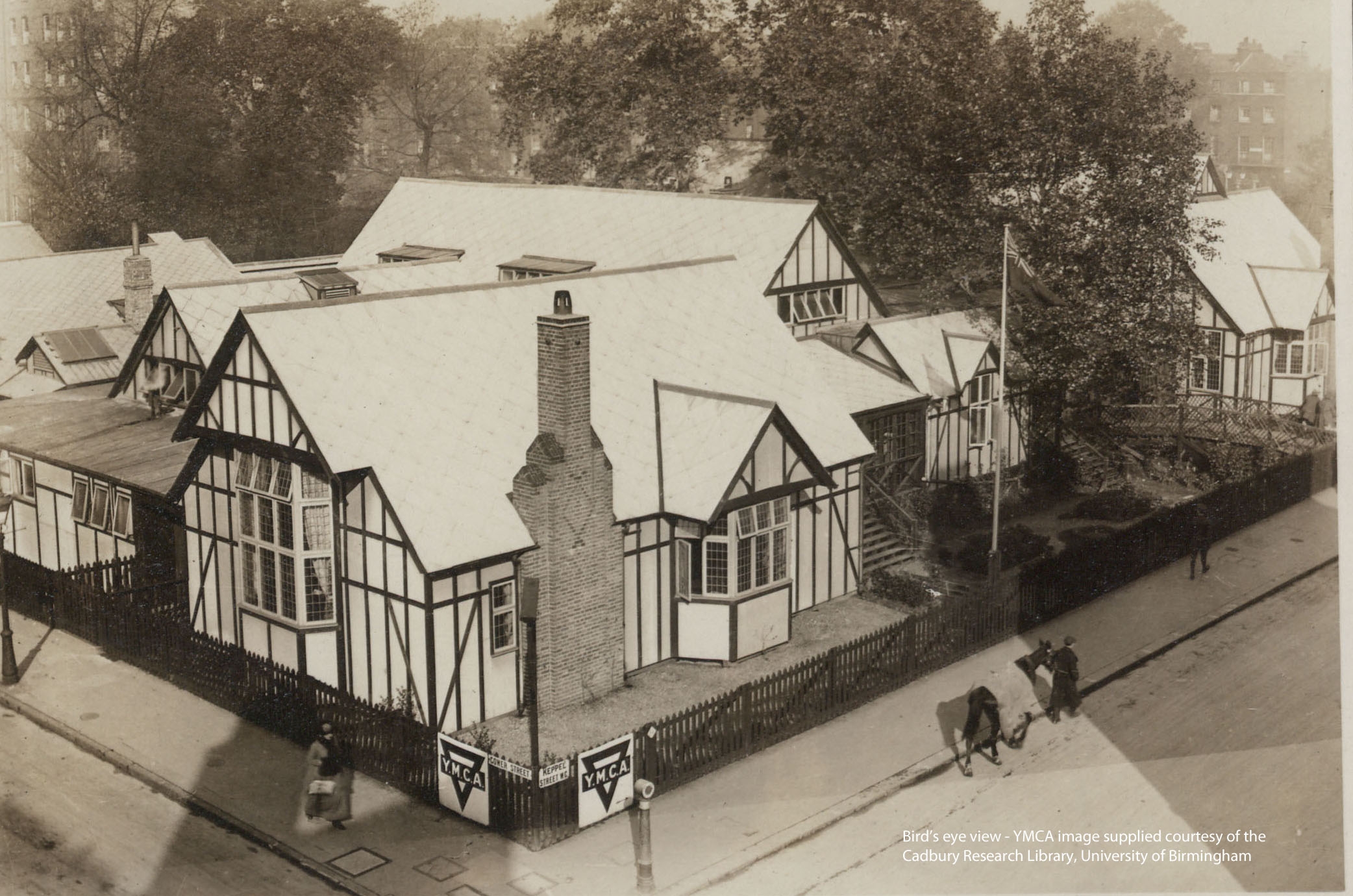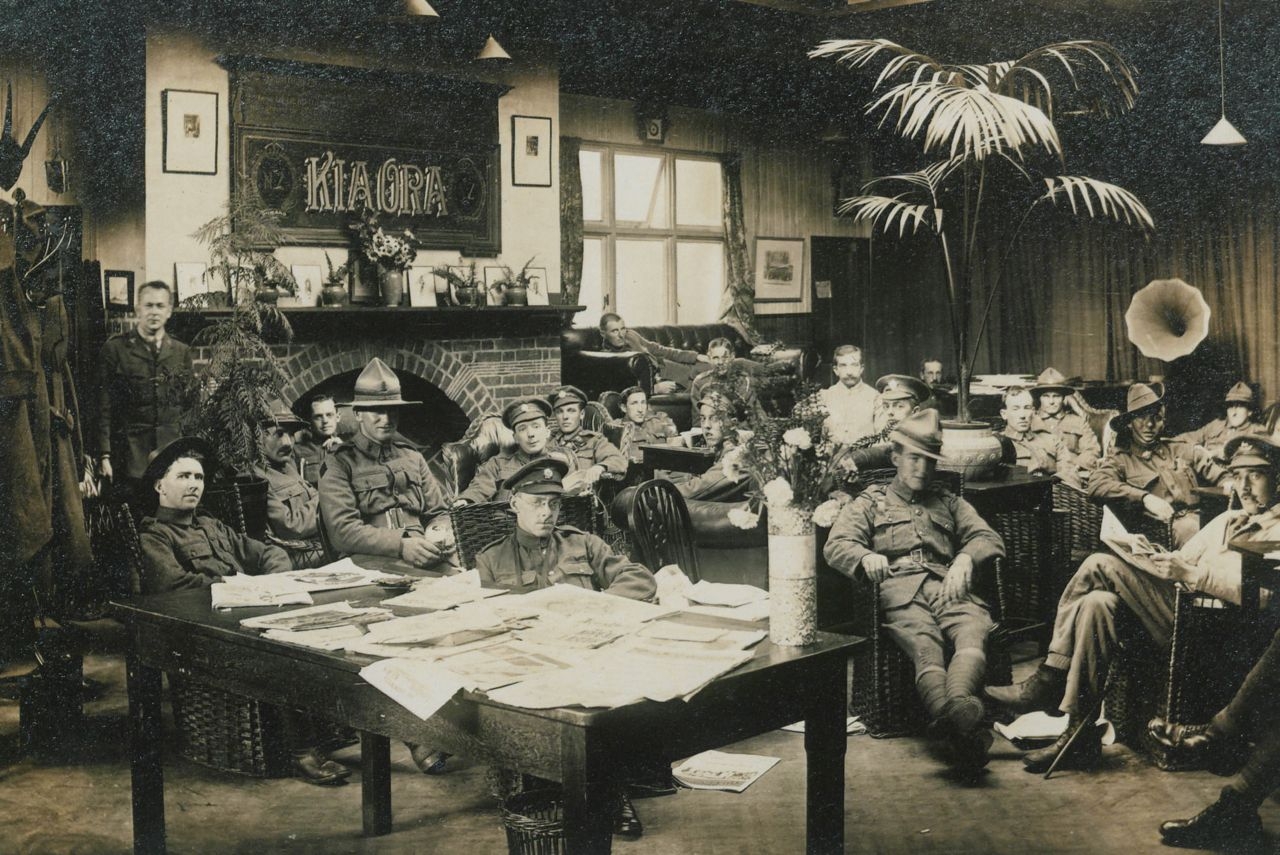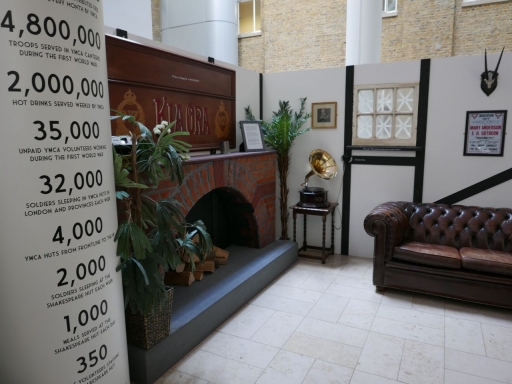The story of a ‘forgotten’ building that entertained First World War soldiers with Shakespeare’s plays is being rediscovered for the Centenary.
In August 1916, the Shakespeare Hut made its debut as a ‘home from home’ for New Zealanders and Australians in the heart of London.
It was among thousands of rest centres for the troops provided by the YMCA (Young Men’s Christian Association) during the Great War. But it was unique in being dedicated to William Shakespeare to mark the tercentenary of his death.
Dame Ellen Terry and other stars of the day topped the bill on a site that was originally intended for a memorial theatre before war intervened.
 A view of the Shakespeare Hut in Bloomsbury, Central London (YMCA image, courtesy of Cadbury Research Library, University of Birmingham)
A view of the Shakespeare Hut in Bloomsbury, Central London (YMCA image, courtesy of Cadbury Research Library, University of Birmingham)
The mock-Tudor buildings, resembling an English village hall, have long since gone, replaced by the grand frontage of the London School of Hygiene and Tropical Medicine.
But this summer, the School is hosting ‘Resurrecting the Shakespeare Hut’ – a project paying tribute to the soldiers, actors and volunteer workers associated with the site a century ago.
“It’s very exciting that we’re able to do this on the footprint of what was here before,” says project co-ordinator Rebecca Tremain, of the London School of Hygiene and Tropical Medicine.
“The project will lift the lid on what life was like for those who used the building, and relive stories of those who fought and lived through the Great War.
“After the installation closes, photographs and recordings will be on display at the Camden Local Studies and Archives Centre where they will be stored to cement the legacy of the Hut, ensuring the public can enjoy its fascinating history for many years to come.”
For the Centenary on August 11th 2016, there’ll be a drama re-enacting the original opening ceremony. The public are welcome but booking is required.
Between now and September 25th, visitors can also step inside a replica room, inspired by an original picture of soldiers relaxing at the Shakespeare Hut.
 The lounge at the Shakespeare Hut (YMCA image, courtesy of Cadbury Research Library, University of Birmingham)
The lounge at the Shakespeare Hut (YMCA image, courtesy of Cadbury Research Library, University of Birmingham)
A visiting newspaper reporter noted in 1918: “We found a packed audience listening with the greatest of delight and pleasure to a part arranged by Sir Johnston Forbes-Roberston and Lady Robertson.
“The party was a most excellent one. The actor knight gave a short address on Shakespeare, illustrated by extracts from his plays. Lady Forbes Robertson sang some character songs admirably.”
In all, the YMCA provided more than 4,000 huts as havens of rest and recuperation for soldiers.
The Shakespeare Hut was one of the largest in London. The Bloomsbury site was originally acquired for a new Shakespeare Memorial National Theatre marking the 300th anniversary of the playwright’s death.
But this was thought unsuitable when war broke out, so it was decided that a YMCA hut should be built, mainly for New Zealand servicemen, and named in memory of Shakespeare. It would welcome nearly 100,000 New Zealanders before finally closing its doors.
Centenary News verdict: ‘Museums are keen to showcase ‘blockbuster’ exhibitions for major anniversaries. But smaller events can be just as revealing. This project at one of Britain’s leading medical institutions offers a glance into the scale of the voluntary effort during the First World War. A few facts tell the story: 350 volunteers, mostly local women, staffed the Shakespeare Hut. Over a 12-month period, nearly 500,000 meals were served and 95 beds let. And remember, this was just one of 4,000 YMCA huts supporting the troops.’
Full details can be found on Resurrecting the Shakespeare Hut. The project, supported by the UK’s Heritage Lottery Fund, is a joint venture between the London School of Hygiene and Tropical Medicine, Digital Drama, a UK-based media production company; and drama producers, The Mustard Club.
YMCA Archive images, courtesy of Cadbury Research Library, University of Birmingham; Exhibition room – Centenary News
Posted by: CN Editor
